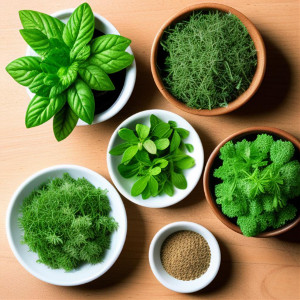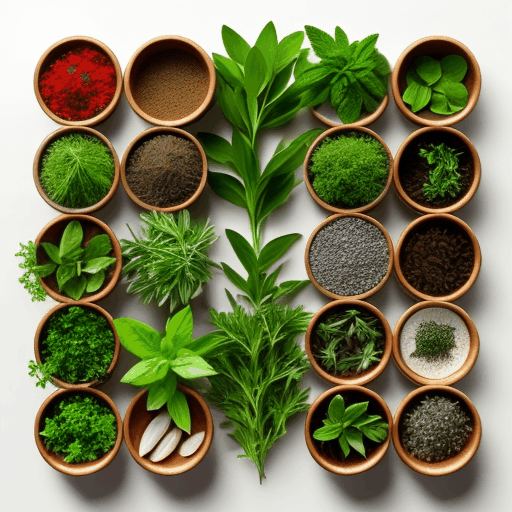Ginkgo biloba: Enhancing Cognitive Vitality
Ginkgo biloba, often revered as the “maidenhair tree,” stands out for its potential cognitive benefits. Rich in flavonoids and terpenoids, this herb is linked to improved memory and mental sharpness. Believed to enhance blood flow to the brain, it offers antioxidant protection against cell damage. Scientific studies suggest modest improvements in cognitive function, particularly in older adults. Ginkgo biloba has been investigated for its potential benefits in managing symptoms of age-related macular degeneration (AMD), tinnitus (ringing in the ears), and intermittent claudication (painful leg cramping). While Ginkgo biloba is generally considered safe for most people when used at recommended doses, it can interact with certain medications, including blood thinners. It’s important to consult with a healthcare professional before using Ginkgo biloba, especially if you are on medication or have underlying health conditions.
2. St. John’s Wort: Nature’s Antidepressant
St. John’s Wort has long been heralded for its potential to alleviate symptoms of mild to moderate depression. Containing hypericin and hyperforin, it may influence neurotransmitters, particularly serotonin. Research, though mixed, hints at its effectiveness comparable to certain pharmaceutical antidepressants. Caution is advised due to interactions with various medications. St. John’s Wort can interact with a variety of medications, including antidepressants, birth control pills, and certain blood thinners. It’s crucial to consult with a healthcare professional before using St. John’s Wort, especially if you are taking other medications.
3. Chamomile: The Calming Elixir
Chamomile, with its delicate flowers, is a soothing remedy known for its calming effects. Traditionally consumed as a bedtime tea, it promotes relaxation and aids in sleep. Beyond its mild sedative properties, chamomile boasts anti-inflammatory and antioxidant benefits, contributing to digestive health and overall well-being. There are two main types of chamomile used for medicinal purposes: Matricaria chamomilla (German chamomile) and Chamaemelum nobile (Roman or English chamomile). While they share some properties, they are distinct species. While chamomile is generally considered safe for most people, individuals with allergies to plants in the Asteraceae family (such as ragweed, marigolds, or daisies) may experience allergic reactions. It’s advisable to test a small amount if you are uncertain.
4. Kava: Pacific Tranquility in a Cup
Kava, originating from the Pacific islands, has been a staple in ceremonial gatherings for its ability to induce relaxation. Kavalactones, its active compounds, interact with the central nervous system, offering anxiety reduction. However, concerns about potential liver toxicity have led to caution and restrictions in some regions. While kava has a long history of traditional use and potential benefits for relaxation and anxiety reduction, the safety concerns, particularly related to liver health, underscore the importance of caution and consultation with a healthcare professional before using kava supplements. If you are interested in exploring the potential benefits of kava, discussing it with a healthcare provider can help you make informed decisions based on your individual health status and considerations.
5. Passionflower: Nature’s Calm Inducer
Passionflower unfolds as a gentle herb, historically used for its calming and sedative properties. Known for its benefits in stress management and sleep support, it is a popular choice for those seeking a natural solution to anxiety. The exact mechanisms by which passionflower exerts its effects are not fully understood, but it is thought to interact with the GABA (gamma-aminobutyric acid) receptors in the brain, promoting relaxation. Its safety profile makes it an accessible option for many. Passionflower can be consumed in various forms, including teas, tinctures, and supplements. Passionflower tea is a popular and easy way to incorporate it into your routine. Scientific research on passionflower is ongoing, and while some studies support its potential anxiolytic and sleep-inducing effects, more research is needed to establish its efficacy definitively.

Navigating Nature’s Pharmacy: Considerations and Cautions
While these herbal allies hold promise, it’s paramount to approach their use with mindfulness. Individual responses can vary, and consultations with healthcare professionals are advisable, especially for those with existing health conditions or taking medications. Regulatory considerations also play a role, as the status of herbal supplements varies across regions.
As you explore the vast offerings of nature’s pharmacy, let curiosity be your guide, and let caution be your companion. Nature’s remedies can complement a balanced lifestyle, contributing to your well-being when used thoughtfully and responsibly.


Recent Comments